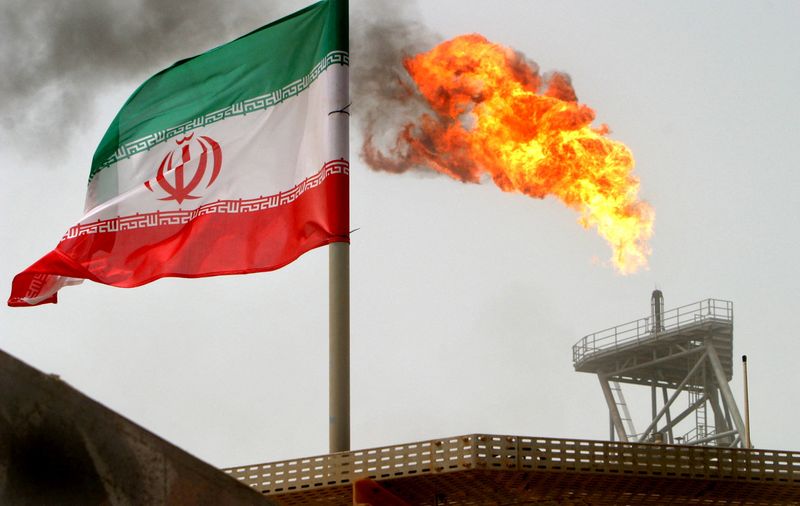By Maha El Dahan, Ahmad Ghaddar and Dmitry Zhdannikov
LONDON (Reuters) - OPEC has enough spare oil capacity to compensate for a full loss of Iranian supply if Israel knocks out that country's facilities but the producer group would struggle if Iran retaliates by hitting installations of its Gulf neighbours.
Iran fired hundreds of missiles at Israel on Tuesday in response to Israeli airstrikes and attacks. Israel’s Prime Minister Benjamin Netanyahu said Iran made a big mistake and would pay for it, and Iran threatened a crushing response if Israel retaliated.
Israel's options include targeting Iranian oil production facilities among other strategic sites, U.S. news website Axios reported on Wednesday citing Israeli officials. Iran is an OPEC member with production of around 3.2 million barrels per day or 3% of global output.
Iranian oil exports have climbed this year to near multi-year highs of 1.7 million bpd despite U.S. sanctions. Chinese refiners buy most of its supply. Beijing says it doesn't recognise unilateral U.S. sanctions.
"In theory, if we lost all Iranian production - which is not our base case - OPEC+ has enough spare capacity to make up for the shock," said Amrita Sen, co-founder of Energy Aspects.
OPEC+, which includes OPEC and allies like Russia and Kazakhstan, has been cutting production in recent years to support prices amid weak global demand. So the group is sitting on millions of barrels of spare capacity.
Cuts by OPEC+ producers currently total 5.86 million bpd. Analysts estimated Saudi Arabia is able to raise output by 3 million bpd and the United Arab Emirates by 1.4 million.
OPEC+ met on Wednesday to discuss compliance with cuts. The group did not discuss the Israeli-Iranian conflict, OPEC+ sources said.
"The only thing mentioned about the geopolitical situation and the conflict was the hope for non-escalation," said an OPEC+ source familiar with the discussions.
While OPEC has enough spare capacity to compensate for the loss of Iranian supplies, much of that capacity is in the Middle East Gulf region and potentially vulnerable should the conflict escalate further, said Giovanni Staunovo, analyst at UBS.
"The effectively available spare capacity might be much lower if renewed attacks on energy infrastructure on countries in the region happen," he said, adding the West might have to tap strategic reserves if there were severe disruptions.
Israel has so far refrained from attacking Iranian oil facilities. Oil analysts and security experts have said Israel could target Iran's oil refining sites and the Kharg Island oil port, which handles around 90% of the country’s crude exports.
During the Iran-Iraq War in the 1980s, Baghdad regularly attacked tankers around Kharg Island and threatened to destroy the oil terminal.
"Iran and its proxies could potentially target energy operations in other parts of the region in order to internationalize the cost if the current crisis devolves into an all-out war," said Helima Croft from RBC Capital Markets.
In 2019, a drone attack by Iranian proxies on Saudi oil processing facilities briefly knocked out 50% of the kingdom’s crude production.
"In case of an escalation Iran's proxies might launch attacks on Middle East oil producers, namely Saudi Arabia," said Tamas Varga from PVM.
Riyadh and Tehran have had a political rapprochement since 2019, which helped ease regional tensions, but relations remain difficult.
Oil prices have traded in a narrow range of $70-90 per barrel over the past years despite the war between Russia and Ukraine and conflict in the Middle East.
A rise in U.S. production has helped ease the fear premium in oil markets, said Rhett Bennett, chief executive at Black Mountain, which has operations in the U.S. Permian basin.
The U.S. produces 13% of global crude and almost 20% of global oil liquid production compared to OPEC's 25% global crude production share and some 40% by OPEC+.
"This diversity of supply from U.S. domestic sources, combined with healthy spare capacity within OPEC, is translating into the market feeling insulated from a dramatic supply shock – regardless of perpetual Middle East flare ups," Bennett said.
A broad conflict in the Middle East, however, with a major impact on production would inevitably push oil prices up.

That would drive up fuel costs. A related rally in gasoline prices could hurt U.S. vice president Kamala Harris in her campaign to win the Nov. 5 presidential election against Republican candidate Donald Trump.
"The United States will likely try to push Israel for a more modest response, wanting to avoid a significant escalation in tensions," said Warren Patterson from ING.